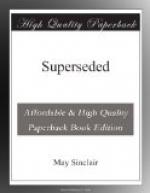“Advances? Rather not. But if I thought he was thinking things—he isn’t, you know, he’s not that sort; still, if I thought it I should have it out with him.”
“How could you have it—’out with him’?”
“Oh I should just ask him what he thought of me; or better still, tell him what I thought of him.”
Miss Quincey shrank visibly from the bold suggestion.
“Would you? Oh, that would never do. You won’t mind my saying so, but I think it would look a little indelicate. Of course it would be very different if it were a woman; if it were you for instance.”
“I should do it any way. It’s the straightest thing.”
“I daresay, dear, in your friendships it is. But I think you can hardly judge of this. You do not know Dr. Cautley as I do.”
“No,” said Rhoda meekly, “perhaps I don’t.” Not for worlds would she have destroyed that beautiful illusion.
“It has been,” continued Miss Quincey, “a very peculiar, a very interesting relationship. Strange too—considering. If you had asked me six months ago I should have told you that the thing was impossible, or rather, that in nine cases out of ten—I mean I should have said it was highly improbable that Dr. Cautley would take the faintest interest in me, let alone like me.”
“He does like you, dear Miss Quincey, I know he does.”
“How do you know?”
“He told me so.” (Miss Quincey quivered and a faint flush worked up through the sallow of her cheek.) “And I’m sure he would be most distressed to think you were unhappy.”
“It is not unhappiness; certainly not unhappiness. On the contrary I have been happy, quite happy lately. And I think it has been bad for me. I wasn’t used to it. Perhaps, if it had happened five-and-twenty years ago—Do not misunderstand me, I am merely speaking of friendship, dear; but it might—I mean I might—”
Far back in the chair and favoured by Rhoda’s silence, Miss Quincey dropped into a dream. Presently she woke up as it were with a start.
“What am I thinking of? Let us be reasonable; let us reduce it to figures. Forty-five—thirty—he is thirty. Take twenty-five from thirty and five remain. Why, Rhoda, he would have been—”
They looked at each other, but neither said: “He would have been five years old.”
Miss Quincey seemed quite prostrated by the result of her calculations. To everything that Rhoda could urge to soothe her she answered steadily:
“You do not know him as I do.”
The voice was not Miss Quincey’s voice; it was the monotonous, melancholy voice of the Fixed Idea.
Her knowledge of him. After all, nothing could take from her the exquisite privacy of that possession.
* * * * *
“Eros anikate machan,” said Rhoda.
Miss Quincey was gone and the Classical Mistress was in school again, coaching a backward student through the “Antigone.”




